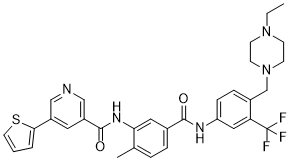All AbMole products are for research use only, cannot be used for human consumption.

ALW-II-41-27 is a Eph receptor tyrosine kinase inhibitor with an IC50 of 11 nM for EPHA2. In H358 cells, treatment with ALW-II-41-27 at a concentration of 1 μM within 15 minutes impaired the tyrosine phosphorylation of the EPHA2 receptor and continued to inhibit the tyrosine phosphorylation through 6 hours. ALW-II-41-27 also dose-dependently inhibited the EPHA2 phosphorylation induced by ligand.
In mice bearing non–small cell lung cancers (NSCLCs), intraperitoneal injection with ALW-II-41-27 at a dose of 15 mg/kg twice daily for 14 days significantly resulted in an inhibition of the growth of H358 tumors. ALW-II-41-27 significantly increased the apoptosis of tumors compared with the vehicle alone or NG-25. This was similar to the effect of the genetic ablation of EPHA2. Compared with treatments with vehicle alone or NG-25, treatment with ALW-II-41-27 did not result in significant differences in the vessel density or proliferation of tumors.

Acta Pharmacol Sin. 2019 Jul 17.
EPHA2 feedback activation limits the response to PDEδ inhibition in KRAS-dependent cancer cells.
ALW-II-41-27 purchased from AbMole
| Cell Experiment | |
|---|---|
| Cell lines | Non–small cell lung cancer (NSCLC) PC-9/ER, PC-9/ERC15, PC-9/ERC16 cell lines |
| Preparation method | Treatment with 1 μM ALW-II-41-27 inhibited cell proliferation and increased apoptosis in erlotinib-resistant NSCLC cell lines. Apoptosis induced by ALW-II-41-27 was accompanied by the increase of cleavage of caspase-3 and PARP as well as decreased expression of antiapoptotic proteins BCL-xL and MCL-1. |
| Concentrations | 1 μM |
| Incubation time | 72 h |
| Animal Experiment | |
|---|---|
| Animal models | 6-week-old athymic nude mice |
| Formulation | |
| Dosages | 15, 30 mg/kg, twice daily |
| Administration | Intraperitoneal injection |
| Molecular Weight | 607.69 |
| Formula | C32H32F3N5O2S |
| CAS Number | 1186206-79-0 |
| Solubility (25°C) | DMSO: ≥ 30 mg/mL |
| Storage |
Powder -20°C 3 years ; 4°C 2 years In solvent -80°C 6 months ; -20°C 1 month |
| Related Ephrin Receptor Products |
|---|
| EphA2 agonist 1
EphA2 agonist 1 is a potent EphA2 receptor agonist.EphA2 agonist 1 is highly active and selective for EphA2 overexpressing glioma cells and stimulates EphA2 phosphorylation. |
| LDN-211904 oxalate
LDN-211904 oxalate is a potent and selective EphB3 inhibitor with an IC50 of 0.079 µM.LDN-211904 oxalate showed good metabolic stability in mouse liver microsomes.LDN-211904 oxalate was shown to be effective in inhibiting STAT3-activated CSC stemness in combination with cetuximab. |
| KYL peptide
KYL peptide is an antagonistic peptide that selectively targets EphA4, and its binding to the ligand-binding domain of EphA4 effectively alleviates Aβ-induced synaptic dysfunction and synaptic plasticity defects in AD mice. In addition, KYL peptide can promote nerve regeneration after injury and modulate immune response. |
| Ifabotuzumab
Ifabotuzumab is an IgG1κ antibody (KD=610 pM) targeting EphA3. Ifabotuzumab is able to cause apoptosis of tumor cells and activate antibody-dependent cell-mediated cytotoxicity (ADCC), which disrupts the tumor vascular system. In addition, Ifabotuzumab reduces idiopathic pulmonary fibrosis (IPF) CCR10+ cells and ameliorates pulmonary fibrosis. |
| Eph inhibitor 1
Eph inhibitor 1 is a potent Eph inhibitor. |
All AbMole products are for research use only, cannot be used for human consumption or veterinary use. We do not provide products or services to individuals. Please comply with the intended use and do not use AbMole products for any other purpose.


Products are for research use only. Not for human use. We do not sell to patients.
© Copyright 2010-2024 AbMole BioScience. All Rights Reserved.
